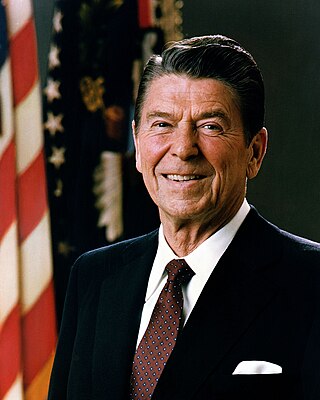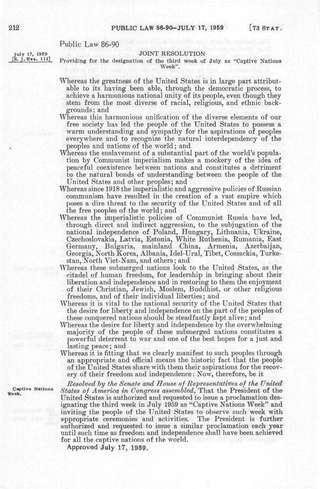
Ronald Wilson Reagan was an American politician and actor who served as the 40th president of the United States from 1981 to 1989. A member of the Republican Party, his presidency constituted the Reagan era, and he was considered one of the most prominent conservative figures in the United States.

National holidays in the United States are 11 calendar dates designated by the U.S. federal government as official holidays. On these days non-essential national offices are closed although the employees receive pay.
This section of the Timeline of United States history concerns events from 1970 to 1989.

In the United States, Flag Day is celebrated on June 14. It commemorates the adoption of the flag of the United States on June 14, 1777, by resolution of the Second Continental Congress. The Flag Resolution, passed on June 14, 1777, stated: "Resolved, That the flag of the thirteen United States be thirteen stripes, alternate red and white; that the union be thirteen stars, white in a blue field, representing a new constellation."

United Nations Day is an annual commemorative day, reflecting the official creation of the United Nations on 24 October 1945. In 1947, the United Nations General Assembly declared 24 October, the anniversary of the Charter of the United Nations, to "be devoted to making known to the people of the world the aims and achievements of the United Nations and to gaining their support for" its work.

Ronald Reagan's tenure as the 40th president of the United States began with his first inauguration on January 20, 1981, and ended on January 20, 1989. Reagan, a Republican from California, took office following a landslide victory over Democratic incumbent President Jimmy Carter in the 1980 presidential election. Four years later, in the 1984 election, he defeated Democrat former vice president Walter Mondale to win re-election in a larger landslide. Reagan was succeeded by his vice president, George H. W. Bush. Reagan's 1980 election resulted from a dramatic conservative shift to the right in American politics, including a loss of confidence in liberal, New Deal, and Great Society programs and priorities that had dominated the national agenda since the 1930s.
German-American Day is a holiday in the United States, observed annually on October 6 under Pub. L. 100–104, 101 Stat. 721. It celebrates German-American heritage and commemorates the founding of Germantown, Pennsylvania in 1683.

Mother's Day is an annual holiday celebrated in the United States on the second Sunday in May. Mother's Day recognizes mothers, motherhood and maternal bonds in general, as well as their positive contributions to their families and society. It was established by Anna Jarvis, with the first official Mother's Day celebrated through a service of worship at St. Andrew's Methodist Church in Grafton, West Virginia, on May 10, 1908. Popular observances include holiday card and gift giving, churchgoing often accompanied by the distribution of carnations, and family dinners. In the United States, Mother's Day complements similar celebrations honoring family members, such as Father's Day, Siblings Day and Grandparents Day.

Captive Nations Week is an annual official observance in the United States aimed at demonstrating solidarity with "captive nations" under the control of authoritarian governments.

The Richard B. Russell National School Lunch Act is a 1946 United States federal law that created the National School Lunch Program (NSLP) to provide low-cost or free school lunch meals to qualified students through subsidies to schools. The program was established as a way to prop up food prices by absorbing farm surpluses, while at the same time providing food to school age children. It was named after Richard Russell, Jr., signed into law by President Harry S. Truman in 1946, and entered the federal government into schools' dietary programs on June 4, 1946.
The National Day of Prayer is an annual day of observance designated by the United States Congress and held on the first Thursday of May, when people are asked "to turn to God in prayer and meditation". The president is required by law to sign a proclamation each year, encouraging all Americans to pray on this day.
National Hispanic Heritage Month is annually celebrated from September 15 to October 15 in the United States for recognizing the contributions and influence of Hispanic Americans to the history, culture, and achievements for the United States.
In the United States, National Ice Cream Month is celebrated each year in July, and National Ice Cream Day is celebrated on the third Sunday in July.
The Day of Valor, officially known as Araw ng Kagitingan, is a national observance in the Philippines which commemorates the fall of Bataan to Japanese troops during World War II. The day is officially celebrated every April 9, the start of the Bataan Death March, although the date was moved on several occasions to avoid it from coinciding with the observance of the Holy Week in the country, especially the Easter Triduum and Easter Sunday, such as in 2009 and 2023.
National Sanctity of Human Life Day is an observance declared by several United States Presidents who opposed abortion typically proclaimed on or near the anniversary of the Supreme Court's decision in Roe v. Wade.

Caribbean Basin Economic Recovery Act of 1983 (CBERA) — P.L. 98-67, Title II, authorized unilateral preferential trade and tax benefits for eligible Caribbean countries, including duty-free treatment of eligible products.
National Dairy Goat Awareness Week is an annual observance in the United States to promote awareness of dairy goats. Since 1988, when the United States Congress voted to officially recognize National Dairy Goat Awareness Week, it has been held each year between the second Saturday of June and the third Saturday of June. Local observances during that week include demonstrations of goat milking and hoof trimming, and goat obstacle courses.
The Catfish Dispute started in 2001, as a trade war between Vietnam and the United States' catfish producers. The main argument concerns the import volume of catfish from Vietnam which results in lower profits for U.S. catfish producers. In dealing with major losses in profit, the Catfish Farmers of America (CFA), presented a series of lawsuits to the U.S. Department of Commerce against frozen catfish from Vietnam.
The National Girls and Women in Sports Day (NGWSD) is an annual day of observance held during the first week of February to acknowledge the accomplishments of female athletes, recognize the influence of sports participation for women and girls, and honor the progress and continuing struggle for equality for women in sports.








